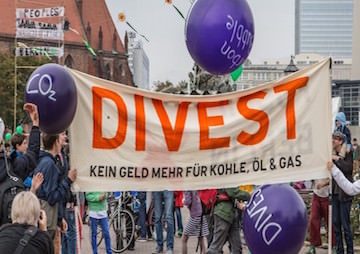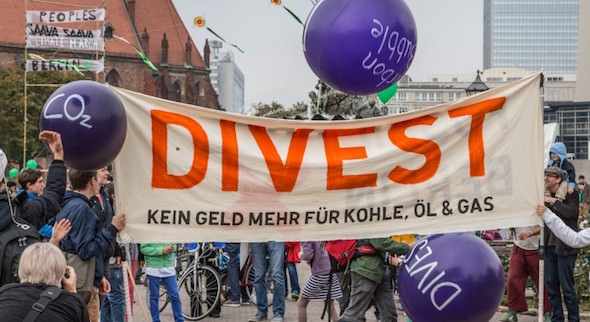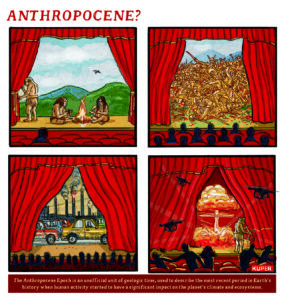Missing the Goal for Limiting Temperature Rise Could Have a Huge Financial Impact
If the global average surface temperature rises by 2.5 degrees Celsius over its pre-industrial level by 2100, $2.5 trillion -- or 1.8 percent -- of the world’s financial assets would be at risk, scientists say.
By Alex Kirby / Climate News Network

A protest in Germany against fossil fuel investment and the growing climate risks. (Tony Webster via Wikimedia Commons)
This piece first appeared at Climate News Network.
LONDON — Do you want to know how much climate change could cost the global economy? UK-based researchers have come up with an answer, which they present with some surprising qualifications.
If global average surface temperature rises by 2.5°C over its pre-industrial level by 2100, they say, then an average of US$2.5 trillion, or 1.8%, of the world’s financial assets would be at risk from the impacts of climate change.
The researchers found that limiting warming to 2°C in 2100 would significantly reduce the “climate Value at Risk” (VaR), which measures the risk to investments, estimating how much they might lose — given normal market conditions — in a set time period.
The average value of global financial assets at risk would be $1.7 trillion, with a one per cent chance of $13.2 trillion being at risk, they add.
Inevitable uncertainties
At the UN climate conference in Paris last December, 195 countries agreed to work to keep global temperature rise this century well below 2°C, and to drive efforts to limit the increase even further, to only 1.5°C above pre-industrial levels. So this estimate sounds fairly reassuring.
But suppose the world overshoots the Paris target and ends up above 2°C by the end of the century? Estimating VaR is by no means an exact science, and the researchers found that the inevitable uncertainties in trying to establish it mean the average risk fails again to tell the whole story.
They say there is a one per cent chance that, in a world 2.5°C warmer, the total level of global financial assets at risk in 2100 could reach $24 trillion, or 16.9% of assets.
The authors point out that this total is almost five times greater than the estimates of $5 trillion for the total stock market capitalisation of fossil fuel companies today.
“Our results may surprise investors, but they
will not surprise many economists
working on climate change”
The researchers, from the Grantham Research Institute on Climate Change and the Environment at the London School of Economics and Political Science and Vivid Economics, publish their findings in Nature Climate Change journal.
The lead author, Professor Simon Dietz, says: “Our results may surprise investors, but they will not surprise many economists working on climate change, because economic models have over the past few years been generating increasingly pessimistic estimates of the impacts of global warming on future economic growth.
Financial assets
“When we take into account the financial impacts of efforts to cut emissions, we still find the expected value of financial assets is higher in a world that limits warming to 2°C. This means risk-neutral investors would choose to cut emissions, and risk-averse investors would be even more keen to do so.
“Our research illustrates the risks of climate change to investment returns in the long run and shows why it should be an important issue for all long-term investors, such as pension funds, as well as financial regulators.”
Of the uncertainties in estimating the climate VaR, he says: “Although we are the first to produce a comprehensive estimate of the climate Value at Risk using an economic model, it is important to remember there are huge uncertainties and difficulties in performing economic modelling of climate change, so this should be seen as the first word on the topic, not the last.”
Alex Kirby is a former BBC journalist and environment correspondent. He now works with universities, charities and international agencies to improve their media skills, and with journalists in the developing world keen to specialise in environmental reporting.
Your support matters…Independent journalism is under threat and overshadowed by heavily funded mainstream media.
You can help level the playing field. Become a member.
Your tax-deductible contribution keeps us digging beneath the headlines to give you thought-provoking, investigative reporting and analysis that unearths what's really happening- without compromise.
Give today to support our courageous, independent journalists.






You need to be a supporter to comment.
There are currently no responses to this article.
Be the first to respond.